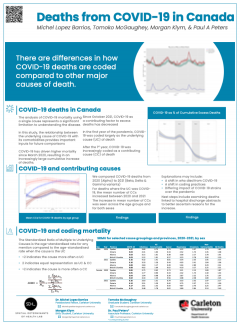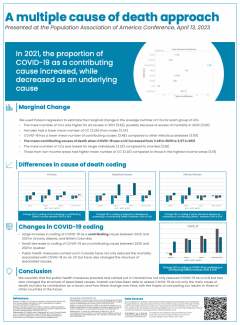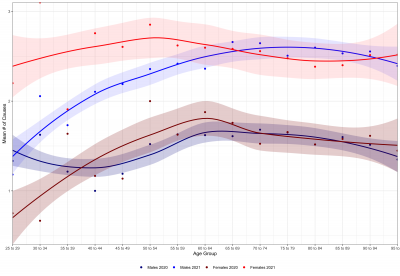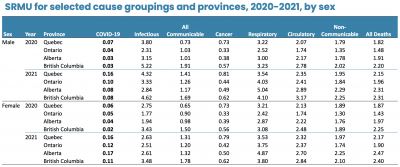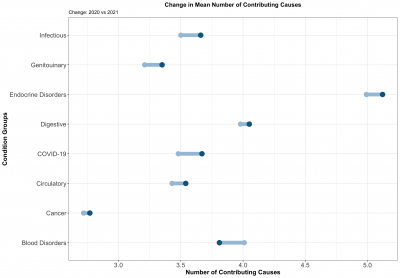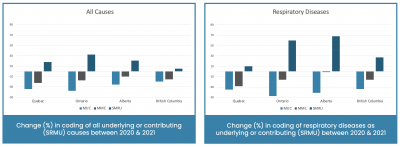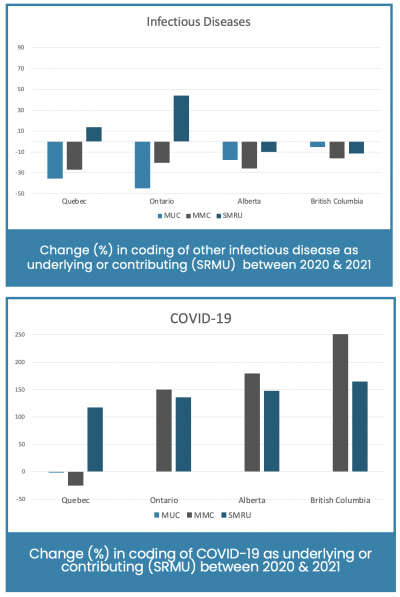Poster Images
COVID-19 Deaths in Canada
Authors: Michel Lopez Barrios, Tomoko McGaughey, Morgan Klym, and Paul Peters
Presented at: Population Association of America Conference, April 13, 2023.
The analysis of COVID-19 mortality using a single cause represents a significant limitation to understanding the disease. In this study, the relationship between the underlying cause of COVID-19 with its comorbidities provides important inputs for future comparisons.
COVID-19 has driven higher mortality since March 2020, resulting in an increasingly large cumulative increase of deaths. Since October 2021, COVID-19 as a contributing factor to excess deaths has decreased. In the first year of the pandemic, COVID-19 was coded largely as the underlying cause (UC) of death. After the 1st year, COVID-19 was increasingly coded as a contributing cause (CC) of death.
COVID-19 and Contributing Causes
We compared COVID-19 deaths from 2020 (Alpha) to 2021 (Beta, Delta & Gamma variants). For deaths where the UC was COVID-19, the mean number of CCs increased between 2020 and 2021. The increase in mean number of CCs was seen across the age groups and for both sexes.
Explanations may include:
- A shift in who died from COVID-19
- A shift in coding practices
- Differing impact of COVID-19 strains over the pandemic
Next steps include examining deaths linked to hospital discharge abstracts to better ascertain reasons for the increase.
COVID-19 and Coding Mortality
The Standardized Ratio of Multiple to Underlying Causes is the age-standardised rate for any mention compared to the age-standardised rate when the cause is the UC.
- <2 indicates the cause more often a UC
- 2 indicates equal representation as UC & CC
- 2 indicates the cause is more often a CC
Marginal Change
We used Poisson regression to estimate the marginal change in the average number of CCs for each group of UCs
- The mean number of CCs was higher for all causes in 2021 (3.33), possibly because of excess of mortality in 2020 (3.26).
- Females had a lower mean number of CC (3.25) than males (3.34)
- COVID-19 has a lower mean number of contributing causes (3.48) compared to other infectious diseases (3.50)
- The mean contributing causes of death when COVID-19 was a UC increased from 3.48 in 2020 to 3.67 in 2021
- The mean number of CCs was lowest for single individuals (3.23) compared to married (3.28)
- Those from low-income areas had higher mean number of CC (3.33) compared to those in the highest income areas (3.19)
Changes in COVID-19 Coding
- Large increase in coding of COVID-19 as a contributing cause between 2020 and 2021 in Ontario, Alberta, and British Columbia.
- Small decrease in coding of COVID-19 as a contributing cause between 2020 and 2021 in Quebec.
- Public health measures carried out in Canada have not only reduced the mortality associated with COVID-19 as an UC but have also changed the structure of associated causes.
Data Sources
We accessed the Canadian Vital Statistics Death Database and Multiple Cause Database through Statistics Canada’s Research Data Centre (RDC). Data accessed through the RDC, which follows strict disclosure protocols in accordance with the Statistics Acts, is exempt from approval by the Research Ethics Board (REB) as per Tri-Council Policy Statement: Ethical conduct for research involving humans (TCPS2) article 2.2 (a).
Funding Sources
Funding for this research was provided by Social Sciences and Humanities Research Council of Canada Insight Grant #435-2021-1052.
